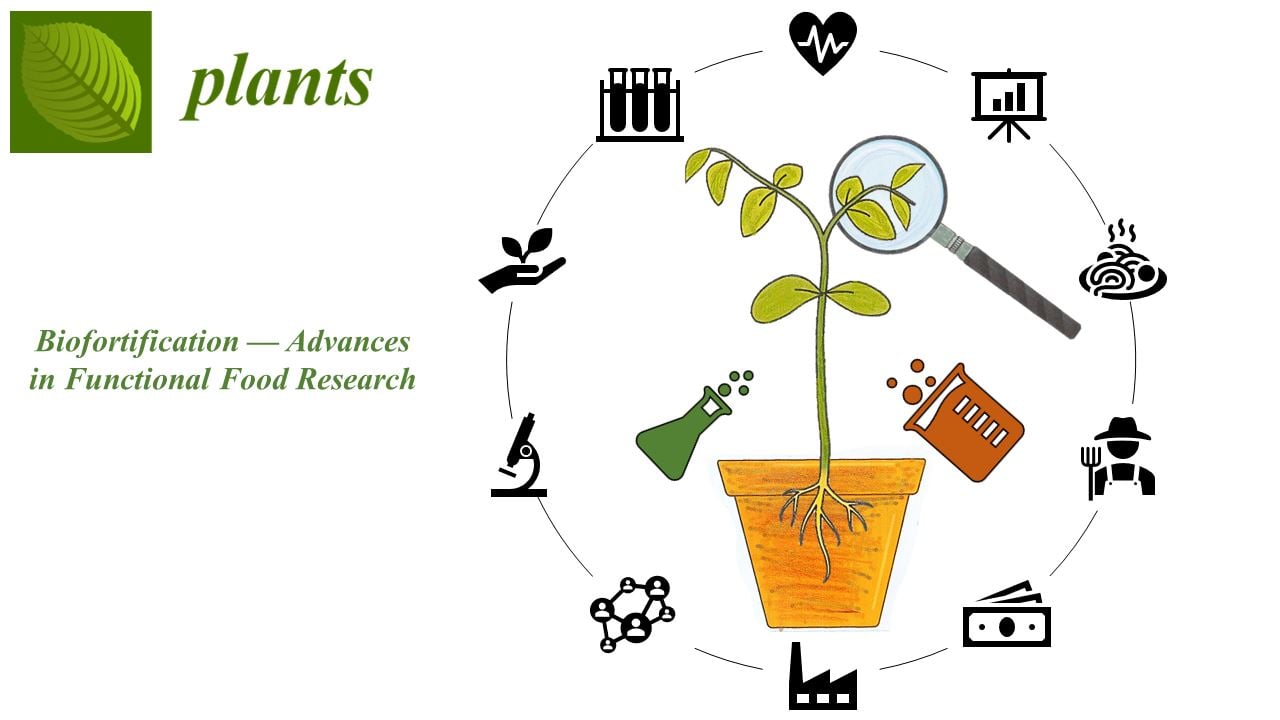- 4.1Impact Factor
- 7.6CiteScore
- 18 daysTime to First Decision
Biofortification—Advances in Functional Food Research
This special issue belongs to the section “Plant Physiology and Metabolism“.
Special Issue Information
Dear Colleagues,
There is no doubt that our health depends largely on the quality of the food we eat. When it lacks some critical macro or micronutrients, we start to get sick. Plant-based foods may not contain enough minerals. One reason for the low content of nutrients in plants is the deficiency of these nutrients in the soils where crops are grown. This deficiency results from the removal of elements with plants' yield, insufficient fertilization, and limitation of the introduction of ingredients into the environment from industrial sources. Elements present in soils can also occur in forms that are difficult to absorb and inaccessible to plants. Growing crops with high yields is also not conducive to the accumulation of large amounts of elements.
One of the promising ways to enrich our diet with specific elements is biofortification. It is one of the methods of plant breeding and production, the task of which is to enhance the nutritional value of the product by supplementing it with bioavailable nutrients such as calcium (Ca), copper (Cu), iron (Fe), iodine (I), magnesium (Mg), selenium (Se) or zinc (Zn) which are present in the natural human diet in a small amount. In other words, it is a food that has an additional positive effect on health over and above the biological nutritional value. Eating these improved foods aims to reduce the occurrence of diseases caused by elemental deficiencies.
Therefore, in this special issue, articles (original research papers, perspectives, hypotheses, opinions, reviews, modelling approaches and methods) that focus on biofortification and production of functional food like whole plant studies, field trials and agronomics in model plants, crop plants, trees, aquatic plants, native species and mushrooms are most welcome.

Dr. Sylwia Budzynska
Guest Editor
Manuscript Submission Information
Manuscripts should be submitted online at www.mdpi.com by registering and logging in to this website. Once you are registered, click here to go to the submission form. Manuscripts can be submitted until the deadline. All submissions that pass pre-check are peer-reviewed. Accepted papers will be published continuously in the journal (as soon as accepted) and will be listed together on the special issue website. Research articles, review articles as well as short communications are invited. For planned papers, a title and short abstract (about 250 words) can be sent to the Editorial Office for assessment.
Submitted manuscripts should not have been published previously, nor be under consideration for publication elsewhere (except conference proceedings papers). All manuscripts are thoroughly refereed through a single-blind peer-review process. A guide for authors and other relevant information for submission of manuscripts is available on the Instructions for Authors page. Plants is an international peer-reviewed open access semimonthly journal published by MDPI.
Please visit the Instructions for Authors page before submitting a manuscript. The Article Processing Charge (APC) for publication in this open access journal is 2700 CHF (Swiss Francs). Submitted papers should be well formatted and use good English. Authors may use MDPI's English editing service prior to publication or during author revisions.
Keywords
- biofortification
- functional food
- diet enrichment
- nutritional value
- supplementation
- elemental deficiencies
Benefits of Publishing in a Special Issue
- Ease of navigation: Grouping papers by topic helps scholars navigate broad scope journals more efficiently.
- Greater discoverability: Special Issues support the reach and impact of scientific research. Articles in Special Issues are more discoverable and cited more frequently.
- Expansion of research network: Special Issues facilitate connections among authors, fostering scientific collaborations.
- External promotion: Articles in Special Issues are often promoted through the journal's social media, increasing their visibility.
- e-Book format: Special Issues with more than 10 articles can be published as dedicated e-books, ensuring wide and rapid dissemination.

